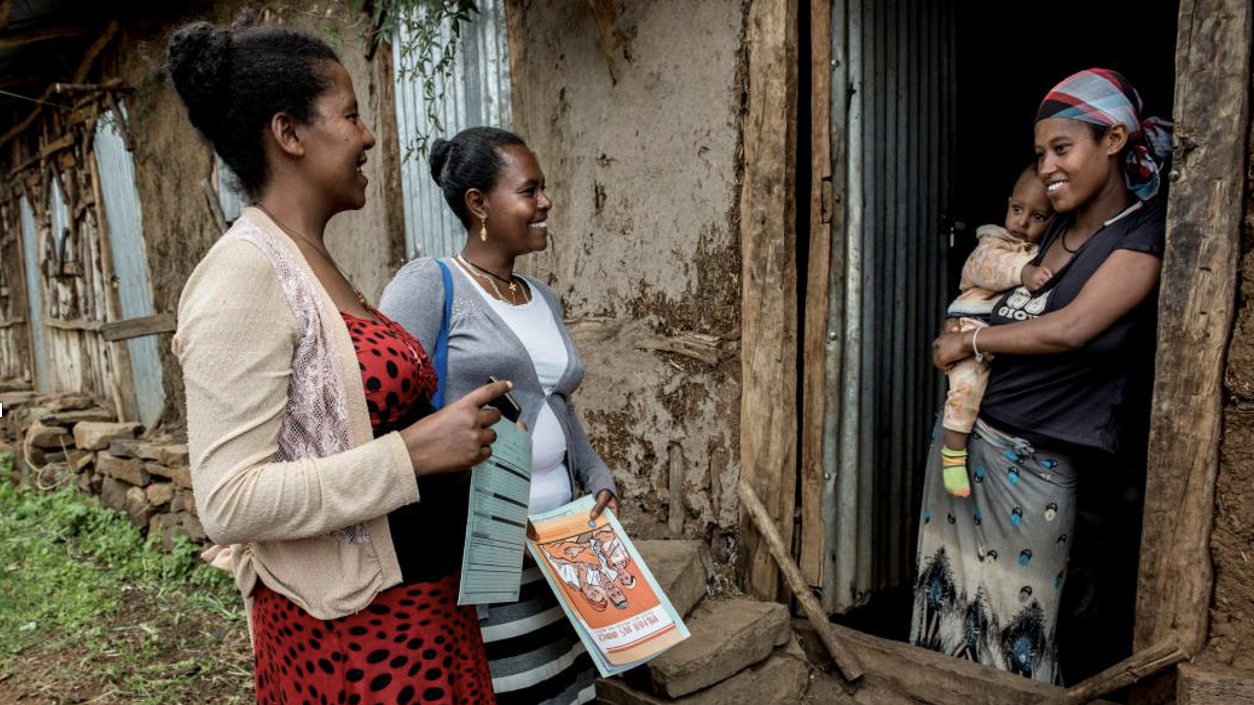The Ethiopian Health Extension Program (HEP) has long been a cornerstone of the country’s public health strategy, especially in rural and underserved areas. Launched with high hopes in 2003, the HEP aimed to advance health-related Millennium Development Goals (MDGs) and provide essential health services to communities with limited access.
From its early years, the HEP demonstrated significant promise. Focusing on health education and preventive measures, its efforts in promoting hygiene, maternal and child health, and disease prevention have been pivotal in advancing public health across Ethiopia. A key strength of the program is its deployment of community health workers (CHWs), who deliver services directly within communities, making health care more accessible, especially in remote and underserved areas.
For example, studies indicate that over 80% of the posts staffed by the program’s health extension workers (HEWs) provide essential services like child health care, family planning, and antenatal care, leading to a significant increase in the coverage of priority health programs between 2000 and 2019.
But over time, the HEP has also faced a series of challenges that have undermined its effectiveness—particularly in addressing nutrition. Our recent study, published in BMC Health Services Research, shows that the HEP has reached a critical juncture where its longstanding model is no longer sufficient and needs a comprehensive overhaul—especially in its approach to nutrition.
In our study, we explored the HEP’s current and future challenges by examining the real-life experiences of HEWs on the ground. The long-term investigation was part of a larger trial carried out in 282 villages across 18 kebeles (wards) in the Gedeo zone of southern Ethiopia. This larger trial assessed how various factors influence the health program in different villages. To gather detailed information, we carried out in-depth interviews with key people involved in the program, organized focus group discussions to gather diverse viewpoints, and observed the program’s implementation to collect in-depth qualitative data on how the HEP is carried out and experienced in the field.
A central problem we found is that the HEP’s ambitious broad focus has sometimes diluted its impact on critical issues including malnutrition and food insecurity, preventing it from addressing targeted nutrition problems with sufficient depth. As a result, nutrition-related performance metrics have declined.
Following are key areas we identified that would benefit from an overhaul:
Limited funding and insufficient training for HEWs, especially in nutrition programs, are undermining the quality and effectiveness of these interventions. Health extension workers at the grassroots level lack adequate training in providing nutrition services. These issues with resources and training make it difficult to implement and sustain programs designed to combat malnutrition, anemia, and stunting. Consequently, the program’s ability to improve nutritional outcomes has fallen short of expectations.
The HEP’s broad, one-size-fits-all approach often fails to address the varied and specific nutritional needs of different communities. The program has frequently overlooked the importance of local dietary practices, cultural beliefs, and economic conditions; effective nutrition interventions require a deep understanding of these local contexts. To improve its effectiveness, the program must adopt strategies that are more sensitive to local dietary habits and cultural practices.
The effectiveness of HEWs—who are crucial for expanding healthcare access, especially in underserved areas—varies depending on the quality of their training and resources, which often fall short regarding nutrition. Improving these aspects could enhance their capacity to deliver targeted nutrition interventions.
The HEP aim of empowering households with knowledge and skills so individuals could better manage their own health has had limited success in cultivating better nutrition. This broad focus on general health education should be complemented with more targeted efforts to address specific nutritional issues effectively. For example, while the HEP promotes general health practices, it has not sufficiently tackled major nutrition challenges such as stunting, low birthweight, anemia, and wasting. Implementing focused interventions—such as growth monitoring programs to identify and address stunting early, or providing targeted support and nutritional supplements for pregnant women to prevent low birthweight—could significantly enhance the program’s effectiveness. Additionally, addressing micronutrient deficiencies through regular distribution of fortified foods and supplements could directly combat issues like iron and vitamin A deficiencies. By integrating these specific interventions with existing health education efforts, the program could achieve a more substantial impact on improving nutritional outcomes.
When considering changes to the HEP, two primary options emerge: Replacement or reform. Replacing the HEP risks completely losing established infrastructure and community trust, potentially disrupting essential health services. Instead, our study indicates that reforming the program to integrate focused nutrition interventions could offer a more balanced approach. Such a reform would preserve the benefits of the community-based model while enhancing the program’s ability to address specific nutritional challenges more effectively.
One promising strategy is to introduce or expand specialized nutrition programs separate from the existing HEP. By establishing dedicated groups of nutritionists operating at the grassroots level, these programs could focus on multi-sectoral nutrition, offering specialized training in addressing issues like malnutrition, anemia, and stunting. This targeted approach could provide tailored solutions that complement the broader goals of the HEP, potentially replicating the initial successes of the program.
In addition, a more comprehensive strategy would involve integrating nutrition initiatives with sectors beyond health such as agriculture, education, and social services. This approach could enhance food security, diversifying diets through sustainable farming practices and the promotion of nutritious crops, linking food production directly with nutritional education.
Engaging communities in nutrition education and decision-making is also crucial. Tailoring educational materials and strategies to local contexts will improve the effectiveness of these interventions. Involving community members in the development and implementation of nutrition programs ensures that solutions are relevant, culturally appropriate, and more likely to be embraced.
Once nutrition interventions are implemented, it is essential to strengthen mechanisms for monitoring and evaluating their impact. Effective monitoring can provide valuable insights into which strategies are working and which need refinement. Regular evaluations will help ensure that nutrition programs remain responsive to the evolving needs of communities and effectively address pressing nutritional challenges.
In conclusion, our research shows that Ethiopia has an important opportunity to reform the HEP by adopting targeted, specialized interventions and integrating nutrition with broader initiatives. Building on the program’s earlier successes, this approach promises not only to improve nutritional outcomes but also to support long-term economic stability and overall well-being for vulnerable populations.
Taddese Zerfu is a Research Fellow with IFPRI’s Development Strategies and Governance (DSG) Unit based in Addis Ababa, Ethiopia. Opinions are the author’s.
Referenced paper:
Zerfu, T.A., Tareke, A.A. & Biadgilign, S. Challenges and experience of the Ethiopian rural health extension program: implications for reform and revitalization. BMC Health Serv Res 23, 1309 (2023). https://doi.org/10.1186/s12913-023-10253-9







